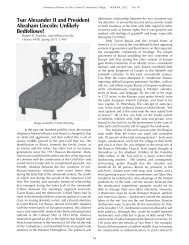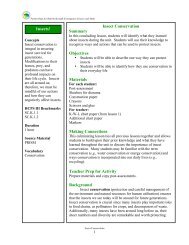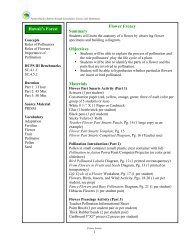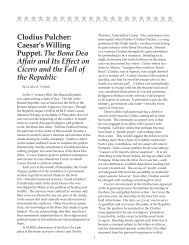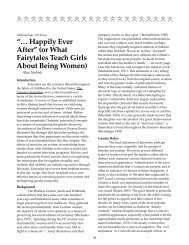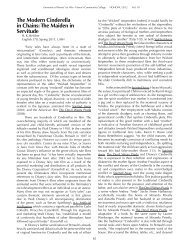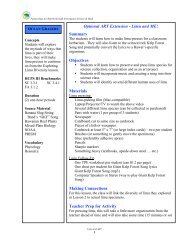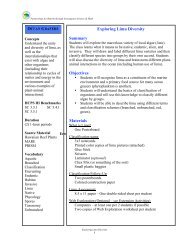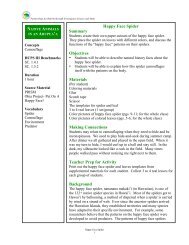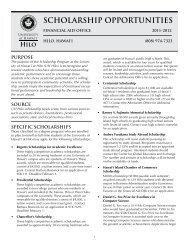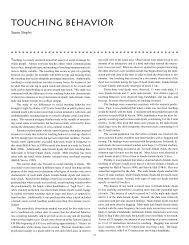A JOURNAL OF ACADEMIC WRITING VOLUME 8
A JOURNAL OF ACADEMIC WRITING VOLUME 8
A JOURNAL OF ACADEMIC WRITING VOLUME 8
Create successful ePaper yourself
Turn your PDF publications into a flip-book with our unique Google optimized e-Paper software.
were not significantly higher than conventional seed yields.18<br />
Norman Borlaug wrote,<br />
I am particularly alarmed by those who seek to deny smallscale<br />
farmers of the Third World—and especially those in sub-<br />
Saharan Africa—access to the improved seeds, fertilizers, and<br />
crop protection chemicals that have allowed the affluent nations<br />
the luxury of plentiful and inexpensive foodstuffs which, in<br />
turn, has accelerated their economic development. 19<br />
While Borlaug is right that fertilizers and improved seeds<br />
have increased crop yields in the developed world, the missing<br />
piece is the cash required to purchase these inputs and build<br />
the extensive irrigation and pesticide systems necessary to make<br />
high-tech agriculture work. Borlaug does not grasp that the<br />
“luxury of plentiful and inexpensive foodstuffs” was achieved<br />
only by heavy investment—that is, investment that Africans<br />
cannot afford. 20 Those seeking to deny Africans of GMOs are<br />
attempting to save those farmers from a fate of licensing fees<br />
and seed-buying cycles. Africa, with the help of the developed<br />
world, may eventually be in a position to use high-tech methods<br />
and GMO crops, but now is not the time. The infrastructure<br />
and a low-risk economic environment must arrive before<br />
GMOs do.<br />
Africa’s current risk in adopting GMOs is extraordinary. In<br />
the briefing “Genetically Modified Crops in Africa: Implications<br />
for Small Farmers,” Devlin Kuyek wrote:<br />
Once a farmer chooses to plant GM crops, it becomes<br />
very difficult to rethink that choice, particularly in the<br />
face of aggressive marketing and sales campaigns by the<br />
manufacturers and the widespread endorsement of such<br />
crops by government agencies. 21<br />
Any seeds saved from the GMO crops would be an<br />
infringement on patents if the proper licensing is not purchased<br />
the next year. If a neighbor grows a non-GMO version of the<br />
same crop and experiences inadvertent cross-pollination, they<br />
would be in violation of copyright laws as well. Essentially,<br />
several non-GMO farmers could suffer from just one farmer<br />
planting GMOs. This means that the risk of planting GMOs<br />
is spread across a community of farmers, whereas any benefits<br />
could only be realized by a single farmer.<br />
The same problem is experienced right here in the U.S.,<br />
and farmers are losing their livelihoods over it. The large<br />
biotechnology company, Monsanto, argues that the benefits<br />
of GMOs, which they cite as reduced pesticide reliance and<br />
reduced water needs, outweigh any drawbacks that may be<br />
18 Lieberman and Gray, “GMOs and the Developing World: A<br />
Precautionary Interpretation of Biotechnology,” 406.<br />
19 Norman Borlaug, “Feeding a World of 10 Billion People: The Miracle<br />
Ahead,” In Vitro Cellular and Developmental Biology, Plant 38, no. 2<br />
(2002): 227.<br />
20 Ibid, 227.<br />
21 Devlin Kuyek, “Genetically Modified Crops in Africa: Implications for<br />
Small Farmers.” Genetic Resources Action International, August 2002,<br />
13.<br />
realized from patent infringement. 22 In the Monsanto<br />
Web site article “Why Does Monsanto Sue Farmers Who<br />
Save Seeds,” the company wrote that not suing “would be<br />
unfair to the farmers that honor their agreements to let others<br />
get away with getting it for free.” 23 In regard to monetary<br />
settlements, Monsanto representative Chris Reat said that<br />
“Our goal has never been to put anybody out of business. The<br />
terms of the settlement have been extended through years . . .<br />
to let the grower . . . try to fit that settlement into his farming<br />
operation.” 24 But paying off settlements to Monsanto doesn’t<br />
fit anywhere in the farming operations of poor African farmers.<br />
While this may fly in the U.S. where national food security is<br />
negligibly affected by picking off patent infringers, Africa needs<br />
to maintain a nurturing environment for all farmers in order<br />
to ensure its food supply. If some African farmers fall victim<br />
to marketing campaigns for GMOs and decide to give them a<br />
try, there will be negative consequences for those farmers, their<br />
farming communities, and their local food security. First, if<br />
the GMO farmer wants to switch back to non-GMO crops<br />
in the future, they must either have a non-GMO seed source<br />
saved or would have to purchase non-GMO seeds. Second, any<br />
GMO seeds that survive and grow into plants would threaten<br />
the integrity of their non-GMO crops by cross-pollination.<br />
Third, any neighboring farmers whose crops were compromised<br />
by GMO pollen could become targeted by biotechnology<br />
corporations for inadvertent patent infringements. Lastly, it<br />
is unethical for the developed world to allow Africa to become<br />
entangled in the kind of situation in which their ability to<br />
produce their own food is on the line. The risks are too great.<br />
The world cannot allow GMOs where acute hunger problems<br />
and poverty thrive, at least until patenting laws are redesigned<br />
to benefit small African farmers.<br />
There is another glaring economic reason why African<br />
countries cannot cultivate GMOs without serious risk. Almost<br />
no GMOs have been developed for use in Africa. Most GMOs<br />
were developed by private corporations for wealthy nations<br />
such as the United States and Canada. They were specifically<br />
designed to thrive in middle latitudes in high-input monocrops.<br />
Africa has extremely varied climates and little advanced<br />
agricultural infrastructure. Maarten Chrispeels, in his article<br />
“Biotechnology and the Poor” wrote about GMO development:<br />
True enough, the big corporations are not working on<br />
the crops of the poor, such as cassava, millets, sorghum,<br />
sweet potatoes, yams, and legumes (other than soybeans).<br />
Furthermore, they are not giving away their technology to<br />
22 E. Freeman, “Why Does Monsanto Patent Seeds?,” http://www.monsanto.<br />
com/monsanto_today/2008/monsanto_patent_seeds.asp.<br />
23 Monsanto Company Online, “Why Does Monsanto Sue Farmers Who<br />
Save Seeds?,” http://www.monsanto.com/monsanto_today/for_the_<br />
record/monsanto_saved_seed_lawsuits.asp.<br />
24 E. Freeman, “Settling the Matter,” http://www.monsanto.com/monsanto_<br />
today/2008/saved_seed_settlements.asp.<br />
HOHONU Volume 8 2010 - 97



